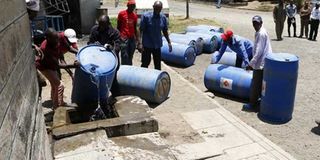Nakuru administrators say law too lenient on illicit brew sellers

Residents help police to destroy some 7,500 litters of methanol at Kasarani Police Post in Nakuru on March 27, 2017. County administrators said leniency in law for suspects charged with the manufacture and sale of illicit brews is a major challenge in the fight against the menace. PHOTO | SULEIMAN MBATIAH | NATION MEDIA GROUP
What you need to know:
- The administrators destroyed 6,760 litres of methanol nabbed from a suspect in Naka estate in December 2016.
- The methanol, in 27 drums, was said to be valued at Sh1.4 million.
- Mr Shaffi said the law is lenient on suspects involved in the illegal business, making it hard to eradicate it.
Nakuru County administrators have cited leniency in law for suspects charged with the manufacture and sale of illicit brews as a major challenge in the fight against the menace.
The administrators said this Monday at Kasarani Police Post during when they destroyed 6,760 litres of methanol nabbed from a suspect in Naka estate in December 2016.
The methanol, in 27 drums, was said to be valued at Sh1.4 million.
The decision was reached after the suspect was charged in court and paid a Sh150,000 and forfeited the product.
Nakuru West Deputy County Commissioner Elmi Shaffi said the law is lenient on suspects involved in the illegal business, making it hard to eradicate it.
CARTELS
“The courts are fairly lenient in giving cash bails and fines where sometimes these cases are abandoned and the suspects end up in the same business again,” said Mr Shaffi.
The sentiments were echoed by his Nakuru East counterpart, Mr Omar Beja, who said there are big cartels in the illegal business.
“Illicit brew is already a big business which involves huge sums of money and it is not easy to just crush it in one day. It also requires joint efforts,” said Mr Beja.
He said such cases are on the rise despite the heavy police crackdown on the business.
“Many people who have been in the business before are willing to take the risk and go back to [it] because it is already established by the cartels and it has a lot of money,” said Mr Beja.





